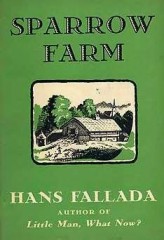12/08/2012
Sparrow Farm Review (January 1938)
As this book as never been translated into French, we believe that our visitors will enjoy the following review, dated January 28, 1938. It has been published in the Sydney Morning Herald. The author of this review is unknown.
Sparrow Farm is the translation of the novel Das Märchen vom Stadtschreiber, der aufs Land flog (1935). In some biographies of Hans Fallada, some confusions have been made with a different novel, published later in 1936, Altes Herz geht auf die Reise, which has nothing to do with fairy tales.

BLACK AND WHITE MAGIC.
A recent translation presents Hans Fallada, regarded hitherto as an unequivocal realist, as a weaver of fairy tales. He admits to walking in the footsteps of the famous Hoffman. He has, however, added a strong flavor of satire to his work which, though it may sometimes be present in the earlier master’s stories, is not so obvious nor so acute. It is this factor which, perhaps, prevents Herr Fallada’s tale from being satisfactory. He is unable to be thoroughly fantastic, to abandon himself to those incredible flights of imagination which complete a magic circle and bring fantasy into the realm of super-realism. There is an earthy, pedestrian quality about his magic which robs it of efficacy, and forces the reader back to sordid reality each time his fancy is about to don, in company with Guntram, the cloak of feathers.
“Sparrow Farm” is the story of a disillusioned city clerk who, on the discovery of hitherto unknown relatives, flies to the country to visit them. Arrived at the farm he becomes the victim of a sorceress and fails hopelessly in love with his beautiful cousin. She is as good as she is beautiful and fights wholeheartedly for him when he becomes entangled in the conflicting magics of those who, for various reasons, wish him hill. Her devotion wins his ultimate redemption and, in the good old tradition, they bid fair to “live happily ever after.”
In a short review it is impossible to give event an outline of the innumerable cross-currents and implications of this story. Herr Fallada, unable to wholly divorce himself from reality, frequently aims shrewd worldly shafts at his wicked fairies. He prefaces his tale by a “Foreword by the Diffident Author” which, while explaining how he came to write the story, suggests that he himself is not very sure of its reception. (“Sparrow Farm”, by Hans Fallada; Putnam.)
15:40 Publié dans Bibliographie, Histoire, miscellanées, Recensions, Textes sur Hans Fallada | Lien permanent | Commentaires (0)




Les commentaires sont fermés.